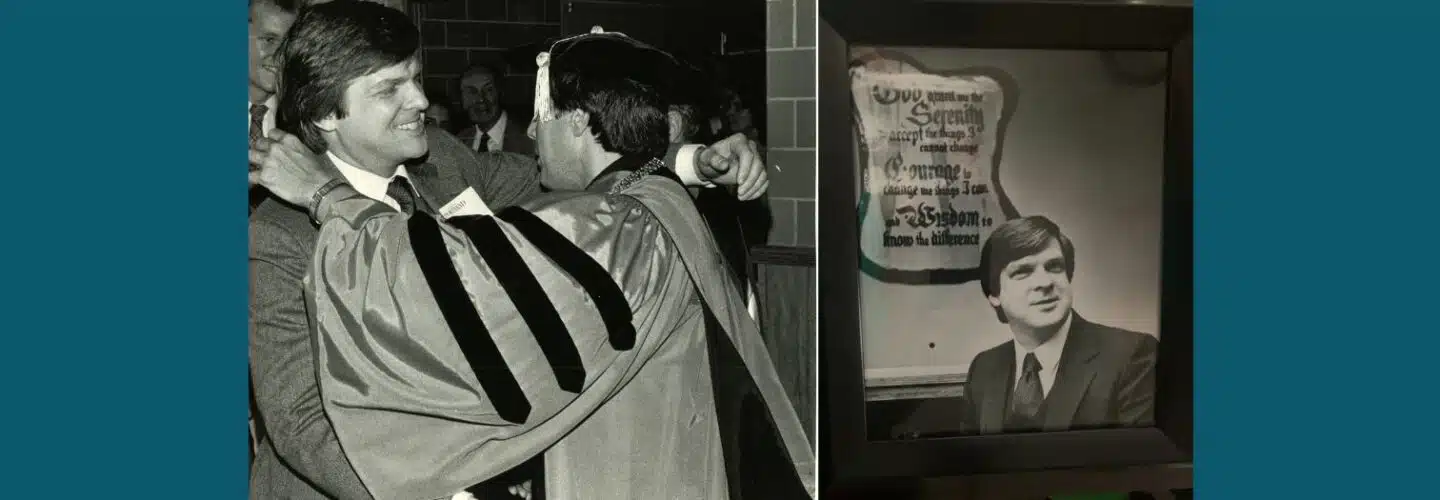In honor of our upcoming 50th anniversary, let’s take a brief look at the origins of Fora Health/De Paul Treatment Center and the person who helped mold the innovative and life-saving organization it would become.
Originally known as the St. Vincent De Paul Treatment Center, we were founded in 1974 by the Society of St. Vincent de Paul to shelter “homeless alcoholics”. The initial aim of the program was to provide food, clothes, lodging, and an environment conducive to “alcohol abuse recovery”.
Steve Newton, who would be the organization’s first CEO, was in recovery from alcohol use disorder himself. He’d lost jobs, went into debt, cut family ties and almost ended his aspirations of becoming a priest. After counseling and Alcoholics Anonymous, he found sobriety and continued his journey to priesthood. The Holy Cross Priests at the University of Portland took Newton in and helped him pay installments on his debts. The priests encouraged Newton to take a CETA-sponsored job as the Assistant Director at St. Vincent De Paul. At the time (1977), its then-director was on his way out and the center was in danger of closing. Newton quickly assumed director status and introduced multiple transformative initiatives that would not only transform De Paul into the Fora Health we know today but ripple into national standards that created support systems throughout the country.
Steve thought the methodology of the treatment center at the time was inadequate and like a “revolving door”; people would go into withdrawal management (then detox) for two weeks, be back on the street for two weeks, and the cycle would repeat itself. He was inspired by treatment programs in China and in June 1978, the program focus was changed from providing a residence and personal maintenance to one of treatment. Three phases of treatment were initiated:
- A 21-day educational phase about alcoholism as an illness.
- A resocialization phase.
- A maintenance and aftercare or outpatient phase.
At the time, De Paul Treatment Centers was the first professional treatment program of its kind in the nation for treating alcoholism.
Newton said, “I wrote the Executive Director of the National Council on Alcoholism, saying what we wanted to do and can you send me some examples of other programs doing the same thing with this population? And his response was, to our knowledge, you’re the only program in the country trying to do this.” Also, since there was little precedent for how to gain accreditation for a program like this at the time, Newton and his team “wrote the manual” on how to do it.
One of the biggest challenges for Newton and the organization at the time was destigmatizing its patients and getting funding – especially since Newton had no formal business training. “I would come in all hours day and night to try to figure out how we were going to make the next payroll. We never missed one, but it took a lot of work, faith and hope.” Newton would even write letters to argue against columns in local papers and make the case for why those suffering SUD were worth saving.
At the time, those with substance use disorder were called “skid row alcoholics” and many thought they were lost causes. Newton and De Paul created public awareness campaigns, spoke with local outlets to extol the virtues of recovery, and most importantly, showed that change was possible. “We were showing people the results. At one point, the state put out a report evaluating all its programs. And we came out way ahead of all other programs in Oregon in terms of both effort and results.”
And to this day, Fora Health is still on the cutting edge of substance use treatment with highly respected and award-winning staff. In 2021, we re-opened with a state-of-the-art facility that received a design award that our patients and colleagues rave about. Dr. Jennifer Hartley and Dr. Eowyn Rieke, were recognized as Top Doctors in Addiction Medicine in Portland Monthly’s 20th annual list of the metro area’s top medical providers. Our peer mentor supervisor Mike Hovey was named Peer Supervisor of the Year. We are the only treatment facility in Oregon that offers a 3.7 level of care. And there’s so much more we have in store.
One of the first slogans De Paul touted was, “Where there’s life, there’s hope.” In different iterations since our founding, we’ve continued that staunch belief that people have the innate ability to change and overcome the disease of addiction. If you’re open and willing to try, we’ll help you – that’s why our employees champion the idea of “radical kindness”.


